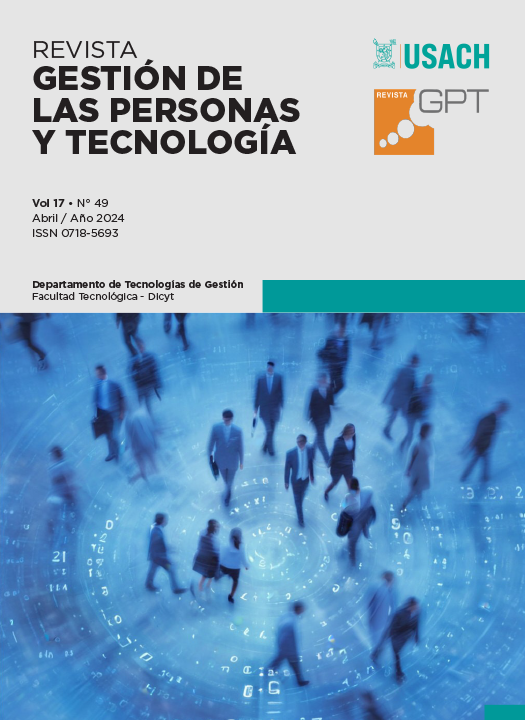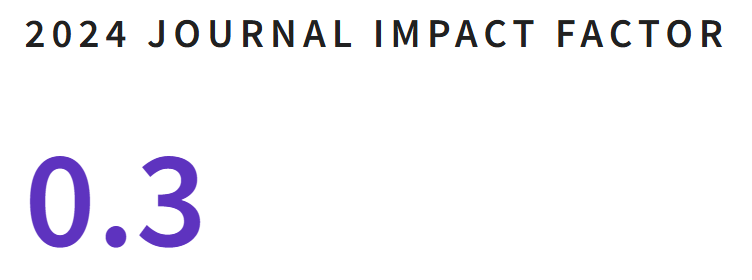Confirmatory Factor Analysis of the Work Performance Scale in Professionals of the Valley of Mexico during the Confinement by COVID 19
DOI:
https://doi.org/10.35588/3jhkjt94Keywords:
job performance, job expectations, teleworking, confirmatory factor analysisAbstract
A psychometric study is presented using confirmatory procedures of the Work Performance Scale of Koopmans, Bernaards, Hildebrandt, Van Buuren, Van der Beek y De Vet (2013) in its Argentine version carried out by Gabini y Salessi (2016) to obtain construct validity in accordance with the original structure and concurrent criterion validity through correlation with the Work Expectations scale (Villa-George, Moreno-Jiménez, Rodríguez-Muñoz, y Villalpando, 2011). A non-experimental-cross-sectional design was used and snowball sampling was applied. The sample was made up of 404 professionals from the Valley of Mexico who were working remotely. The three-factor structure was analyzed (performance in the task, counterproductive behaviors and performance in the context) and with 12 items, the results indicate good reliability of the instrument, an adequate fit of the model to the data, and relevant convergent construct validity. It is considered that the scale is a recommended instrument for the evaluation of Work Performance in Mexican professionals.
Downloads
References
Acosta, A., Ruiz, L., Marín, M. y Guerrero, E. (2019). Estrés ocupacional y evaluación de desempeño en docentes universitarios del departamento del Cesar. Revista Encuentros, 17(1), 24-33. http://dx.doi.org/10.15665/encuent.v17i01.1595
Álvarez, I. B., Alfonso, P. D. y Indacochea, G. B. (2018). El desempeño laboral: un problema social de la ciencia. Didáctica y educación, 9(2), 147-158. https://dialnet.unirioja.es/servlet/articulo?codigo=6596591
Álvarez, C. H. (2020). Del recurso al teletrabajo como medida de emergencia al futuro del trabajo a distancia. Revista de Relaciones Laborales, 43, 175-201. https://doi.org/10.1387/lan-harremanak.21722
Anchundia, A. M. A. y Hurtado, S. I. C. (2021). Desempeño laboral de los empleados administrativos en la modalidad de teletrabajo en una empresa agroindustrial. (Tesis de grado). Universidad de Guayaquil, Ecuador.
http://repositorio.ug.edu.ec/handle/redug/56400
Benavides, F., Amable, M., Cornelio, C., Vives, A., Carmenate, L., Barraza, D., Bernal, D., Silva, M. y Delclos, J. (2021). El futuro del trabajo tras la COVID-19: el papel incierto del teletrabajo en el domicilio. Revista Brasileira de Saúde Ocupacional, 46(31), 1-8. https://doi.org/10.1590/2317-6369000037820
Bohórquez, E., Pérez, M., Caiche, W. y Benavides, R. A. (2020). La motivación y el desempeño laboral: el capital humano como factor clave en una organización. Universidad y Sociedad, 12(3), 385-390. http://scielo.sld.cu/scielo.php?pid=S2218-36202020000300385&script=sci_abstract&tlng=en
Castro, R. S. C. (2019). La satisfacción con el método de trabajo y características personales, como predictores del desempeño contextual en el servicio técnico informático de la Universidad de La Laguna. (Tesis de Maestría). Universidad de la Laguna, España. https://riull.ull.es/xmlui/handle/915/17406
Cendales, A. B., Segura, C. S. y González, B. M. (2022). Variables e Instrumentos para la evaluación del desempeño individual en el trabajo. Cuadernos Latinoamericanos de Administración, 34(18), 1-17. https://doi.org/10.18270/cuaderlam.v18i34.3950
Cuero, C. (2020). La pandemia del COVID-19. Revista Médica de Panamá, 40(1), 1-2. https://doi.org/10.37980/im.journal.rmdp.2020872
Escudero, X., Guarner, J., Galindo, A., Escudero, M., Alcocer, M. y Del Rio, C. (2020). La pandemia de coronavirus SARS-CoV-2 (COVID-19): situación actual e implicaciones para México. Cardiovascular and Metabolic Science, 31(3), 170-177. https://dx.doi.org/10.35366/93943
Gabini, S. y Salessi, S. (2016). Validación de la Escala de Rendimiento Laboral Individual en trabajadores argentinos. Revista Evaluar, 16(1), 10-26. https://doi.org/10.35670/1667-4545.v16.n1.15714
Hafshah, R. N., Najmaei, M., Mansori, S. y Fuchs, O. (2022). The Impact of Remote Work During COVID-19 Pandemic on Millennial Employee Performance: Evidence from the Indonesian Banking Industry. Journal of Insurance Financial Management, 2(7), 13–19. https://portal.issn.org/resource/ISSN/2371-2112
Hansez, I., Demerouti, E. y Chimiel, N. (2012). Performance expectations, personal resources, and job resources: How do they predict work engagement?, European Journal of Work and Organizational Psychology, 18(6), 1-16. https://doi.org/10.1080/1359432X.2012.704675
Hu, L.T. y Bentler, P.M. (1999). Cutoff criteria for fit indexes in covariance structure analysis: Conventional criteria versus new alternatives. Structural Equation Modeling, 6(1), 1–55. https://doi.org/10.1080/10705519909540118
Huarcaya, J. (2020). Consideraciones sobre la salud mental en la pandemia de COVID-19. Revista Peruana de Medicina Experimental y Salud Pública, 37(2), 327-334. https://doi.org/10.17843/rpmesp.2020.372.5419
Jara, A., Asmat, N., Alberca, N. y Medina, J. (2018). Gestión del talento humano como factor de mejoramiento de la gestión pública y desempeño laboral. Revista Venezolana de Gerencia, 23(83), 740-758. https://www.redalyc.org/jatsRepo/290/29058775014/29058775014.pdf
Kenny, D. A. y Milan, S. (2012). Identification: A nontechnical discussion of a technical issue. En R. H. Hoyle (Ed.). Handbook of structural equation modeling (pp.145–163). New York: Guilford Press.
Koopmans, L., Bernaards, C. M., Hildebrandt, V. H., Schaufeli, W. B., de Vet, H. C. y Van der Beek, A. J. (2011). Conceptual frameworks of individual work performance: A systematic review. Journal of occupational and environmental medicine, 53(8), 856-866. https://doi.org/10.1097/JOM.0b013e318226a763
Koopmans, L., Bernaards, C. M., Hildebrandt, V. H., Van Buu¬ren, S., Van der Beek, A. J. y De Vet, H. C. (2013). Development of an individual work performance ques-tionnaire. International Journal of Productivity and Performance Management, 62(1), 6-28. https://doi.org/10.1108/17410401311285273
Koopmans, L., Bernaards, C. M., Hildebrandt, V. H., De Vet, H. C. y Van der Beek, A. J. (2014). Measuring individual work performance: Identifying and selecting indicators. Work, 48(2), 229-238. https://doi.org/10.3233/WOR-131659
Koopmans, L., Bernaards, C. M., Hildebrandt, V. H., Lerner, D., de Vet, H. C. y Van der Beek, A. J. (2016). Cross-cultural adaptation of the Individual Work Performance Questionnarie. Work, 53(3), 609-619. https://doi.org/10.3233/WOR-152237
Kowalski, K. B., Aruldoss, A., Gurumurthy, B. y Parayitam, S. (2022). Work-From-Home Productivity and Job Satisfaction: A Double-Layered Moderated Mediation Model. Sustainability, 14(18), 11179. https://doi.org/10.3390/su141811179
Lepold, A., Tanzer, N. y Jiménez, P. (2018). Expectations of Bank Employees on the Influence of Key Performance Indicators and the Relationship with Job Satisfaction and Work Engagement. Social Sciences, 7(6), 99. https://doi.org/10.3390/socsci7060099
Lorente, L., Salanova, M., Martínez, M. I. y Vera, M. (2014). How personal resources predict work engagement and self-rated performance among construction workers: A social cognitive perspective. International Journal of Psychology, 3(49), 200–207. https://doi.org/10.1002/ijop.12049
Lozada, A. y Criollo, J. (2020). El teletrabajo y su incidencia en el desempeño laboral del personal administrativo de la empresa Grupo Sur capacitación y consultoría. (Tesis de grado). Universidad Técnica de Ambato, Ecuador. https://repositorio.uta.edu.ec/handle/123456789/31866?locale=en
Morata-Ramírez, M. A., Holgado-Tello, F. P., Barbero-García, I. y Méndez, G. (2015). Análisis factorial confirmatorio. Recomendaciones sobre mínimos cuadrados no ponderados en función del error Tipo I de Ji-Cuadrado y RMSEA. Acción Psicológica, 1(12), 79-90. https://dx.doi.org/doi.org/10.5944/ap.12.1.14362
Morey, M., Mercadal, M., Lera, E. y García, V. (2020). Manifestaciones cutáneas en contexto del brote actual de enfermedad por coronavirus 2019. Anales de Pediatría, 92(6). 374-375. https://dx.doi.org/10.1016%2Fj.anpedi.2020.04.013
OIT. (2020). El teletrabajo durante la pandemia de COVID-19 y después de ella – Guía práctica. https://www.ilo.org/global/publications/WCMS_758007/lang--es/index.htm
ONU. (01 de junio 2020) ¿Ha llegado el teletrabajo para quedarse? Como el coronavirus puede cambiar el futuro del trabajo. Noticias ONU. https://news.un.org/es/story/2020/06/1475242
ONU. (06 de julio 2021). Teletrabajo en América Latina: 23 millones de persones trabajaron desde casa durante la pandemia de COVID-19. Noticias ONU. https://news.un.org/es/story/2021/07/1494012
Paul, V. M. T. y Devi, N. U. (2018). Psychological Capital, Outcome Expectation and Job Performance: A Mediated Model of Innovative Work Behavior. International Journal for Research in Engineering Application & Management, 1(1), 52-60. https://doi.org/10.18231/2454-9150.2019.0460
Pérez, D. J., Bustos, A. J. M., Vanegas, R. M. C. y Barrientos, D. C. (2023). Capital psicológico, expectativas y compromiso organizacional en el contexto del teletrabajo de los trabajadores mexicanos. Visión Gerencial, 22(2), 257-272. https://doi.org/10.53766/VIGEREN
Pedraza, E., Amaya, G. y Conde, M. (2010). Desempeño laboral y estabilidad del personal administrativo contratado de la Facultad de Medicina de la Universidad del Zulia. Revista de Ciencias Sociales, 16(3), 493-505. https://www.redalyc.org/pdf/280/28016320010.pdf
Qu, J. y Yan, J. (2022). Working from home vs working from office in terms of job performance during the COVID-19 pandemic crisis: evidence from China. Asia Pacific Journal of Human Resources, 61(2), 1-36. https://doi.org/10.1111/1744-7941.12353
Ramdani, Z., Marliani, R. y Rahman, A. B. (2019). The individual work performance scale: a psychometric study and its application for employee performance. Humanities & Social Sciences Reviews, 5(7), 405-414. https://doi.org/10.18510/hssr.2019.7545
Ramos-Villagrasa, P., Barrada, J. R., Fernández del Río, E. y Koopmans, L. (2019). Assessing job performance using brief self-report scales: the case of the individual work performance questionnaire. Revista de Psicología del Trabajo y de las Organizaciones, 35(3), 195-205. https://dx.doi.org/10.5093/jwop2019a21
Ramos, V., Ramos, C. y Tejera, E. (2020). Teletrabajo en tiempos de COVID-19. Revista Interamericana de Psicología, 54(3), 1-29. https://doi.org/10.30849/ripijp.v54i3.1450
Rivero, Y. (2019). Evaluación del desempeño: tendencias actuales. Revistas Archivos Médicos de Camagüey, 23(2), 159-164. http://scielo.sld.cu/scielo.php?script=sci_arttext&pid=S1025-02552019000200159
Rotundo, M. y Sackett, P. R. (2002). The Relative Importance of Task, Citizenship, and Counterproductive Performance to Global Ratings of Job Performance: A Policy-Capturing Approach. Journal of Applied Psychology, 87(1), 66–80. https://doi.org/10.1037//0021-9010.87.1.66
Ruíz, M. A., Pardo, A. y San Martín, R. (2010). Modelos de ecuaciones estructurales. Papeles del Psicólogo, 31(1), 34-45. http://www.cop.es/papeles
Thani, A., Min, M. y Sakarji, S. (2022). The Mediating Role of Employee Work Motivation in The Relationship between Working From Home and Job Performance. International Journal of Academic Research in Accounting Finance and Management Sciences, 12(3), 12–25. https://doi.org/10.6007/IJARAFMS/v12-i3/14288
Thu, N. H., Loan, L. y Quynh, N. D. (2022). Employees’ job satisfaction, job performance and their relationship during the COVID–19 pandemic in Vietnam. Organizational Psychology, 12(2), 38–55. https://doi.org/10.17323/2312-5942-2022-12-2-38-55
UNAM. (2019). Comisión de Ética de la Facultad de Estudios Superiores, Zaragoza. https://www.zaragoza.unam.mx/wpcontent/2022/Reglamentos/Reglamento_etica_de_la_FESZ.pdf
Velázquez, P. (2020). La COVID-19: reto para la ciencia mundial. Academia de ciencias de Cuba. http://www.revistaccuba.sld.cu/index.php/revacc/article/view/763/792
Villa-George, F. I., Moreno-Jiménez, B., Rodríguez-Muñoz, A. y Villalpando, J. (2011). Factorial validity of the job expectations questionnaire in a sample of Mexican workers. The Spanish Journal of Psychology, 14(2), 1010-1017. http://dx.doi.org/10.5209/rev_SJOP.2011.v14.n2.46
Weller, J. (2020). La pandemia del COVID-19 y su efecto en las tendencias de los mercados laborales. Documentos de Proyectos (LC/TS.2020/67). Santiago, Comisión Económica para América Latina y el Caribe (CEPAL). https://repositorio.cepal.org/bitstream/handle/11362/45759/1/S2000387_es.pdf
West, S. G., Taylor, A. B. y Wu, W. (2012). Model fit and model selection in structural equation modeling. En R. H. Hoyle (Ed.), Handbook of Structural Equation Modeling (pp. 209-231). New York: Guilford Press.
World Medical Association (2013). World Medical Association Declaration of Helsinki: ethical principles for medical research involving human subjects. JAMA, 310(20), 2191–2194. https://doi.org/10.1001/jama.2013.281053
Downloads
Submitted
2023-09-04Published
Versions
- 2024-05-08 (4)
- 2024-05-03 (3)
- 2024-04-30 (2)
- 2024-04-30 (1)
Issue
Section
License
Copyright (c) 2024 People and Technology Management Journal

This work is licensed under a Creative Commons Attribution-NonCommercial-NoDerivatives 4.0 International License.










